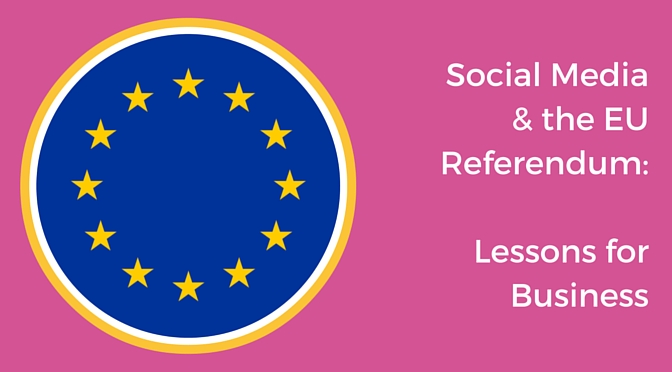
One week ago today, the nation went to the polls – with exceptional results. Which ever way you voted, there’s no denying that it’s been an unpredictable and unsettling few days since, with so much up in the air now. What’s been interesting for me is just how much of the debate and fallout since has taken place online – specifically, on social networks. It’s a stark reminder of just how much communication has changed in the past decade, and there are several lessons for business here, if we choose to look for them. Here’s my three takeaways:
1. Communication has changed – forever.
Ten years ago, the only people who knew of your political allegiances were the people you chose to talk to – usually in person. Down the pub, round the kitchen table – it was a limited audience and you had to look the person in the eye regardless of whether you agreed with them or not. Social media has changed that, forever. Now, you can notify thousands of people at once about how and why you intend to vote. This has power – and consequences.
Sharing passion on mass can be persuasive and exciting. Heated debates between people you’ve never actually met, however, can often turn nasty online. The anonymity of the internet can lead to things being said that simply wouldn’t be uttered if the person was standing in front of you. Seeing the EU referendum debate unfold online over recent weeks I’ve seen some reasoned and articulate arguments that have made me rethink my own stance and reflect on different aspects. I’ve also seen insults, abuse and narrow-mindedness amplified. It’s exciting and troubling simultaneously – and here lies the crux for business.
Uniting people around a common cause and sharing a passion for a particular topic can be great for business leaders. Exciting people to the point where they want to talk about your business to others is what we’re all looking to do online. But it doesn’t come without risk. For every person you fire up, another may feel abandoned. For every person who buys in to your brand values completely, another will be left cold.
The takeaway for me is that this is okay, when done respectfully. We can’t please everyone all the time. Disagreeing on things is inevitable – insulting and abusing is not. But a little fire and enthusiasm mean that those we do please will feel especially connected – as we’ve seen throughout this referendum debate.
2. It’s time to get emotional.
I’m not surprised the Leave campaign won, not least because the majority of its marketing and communications was so much more emotive than that of Remain. At times this emotional recourse seemed to be at the expense of groups within our society (ex-pat Europeans living here in the UK for example), and that’s troubling, but the impact of these communications clearly worked.
Mark Ritson in Marketing Weekly called it a couple of weeks before the vote in his article Why the Leave campaign is winning the emotional argument on Brexit and it’s a timely reminder for all marketers of the power and impact our emotional reasoning can have. Worth digging in to your core products and services and answering the following questions again: What are the benefits for customers? And what’s the emotional translation of that? We can all apply emotional and personal impact to our offering, without taking away from others at the same time.
3. Harness the power of your community.
In the end, it wasn’t really the politicians or the billboards that persuaded us of our decision. It was our friends and family, our social connections, and the many small and myriad reasons being shared each day. Facebook’s algorithm means this ends up being a bit skewed of course. Stronger In supporters probably saw more Remain arguments in their newsfeed than anything else, and the reverse was true for the Leavers.
It means we all end up with a slightly distorted reality but it also reminds us how much power there is in a community. Social media has enabled those people keen to express their support for and solidarity with Europeans living in Britain, for example, to quickly rally and organise public gatherings on mass. It also means that despicable behaviour like the racist abuse witnessed on a Manchester tram was able to be shared quickly online so that the perpetrators could be identified and arrested.
Your brand doesn’t have to be the sole authority therefore – look to your community for answers, for support and for different perspectives that might enrich what you’re trying to do. Think social – be social: there’s wisdom among the crowd.